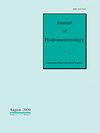Hybrid Assimilation of Snow Cover Improves Land Surface Simulations over Northern China
IF 2.9
3区 地球科学
Q2 METEOROLOGY & ATMOSPHERIC SCIENCES
引用次数: 0
Abstract
Ensemble data assimilation (DA) is an efficient approach to reduce snow simulation errors by combining observation and land surface modeling. However, the small spread between ensemble members of simulated snowpack, which typically occurs for a long time with 100% snow cover fraction (SCF) or snow-free conditions. Here we apply a hybrid DA method, in which direct insertion (DI) is a supplement of the ensemble square root filter (EnSRF), to assimilate the spaceborne SCF into a land surface model, driven by China Meteorological Administration Land Data Assimilation System high-resolution climate forcings over northern China during the snow season in 2021-2022. Compared to the open loop experiment (without SCF assimilation), the root mean square error (RMSE) of SCF is reduced by 6% through the original EnSRF, and is even lower (by 14%) in the EnSRFDI (i.e., combined DI and EnSRF) experiment. The results reveal the ability of both EnSRF and EnSRFDI to improve the SCF estimation over regions where the snow cover is low, while only EnSRFDI is able to efficiently reduce the RMSE over areas with high SCF. Moreover, the SCF assimilation is also observed to improve the snow depth and soil temperature simulations, with the Kling-Gupta efficiency (KGE) increasing at 60% and 56%-70% stations respectively, particularly under conditions with near-freezing temperature, where reliable simulations are typically challenging. Our results demonstrate that the EnSRFDI hybrid method can be applied for the assimilation of spaceborne observational snow cover to improve land surface simulations and snow-related operational products.积雪的混合同化改善了中国北方地面模拟
集合数据同化(DA)是一种将观测与地面模拟相结合的有效方法。然而,在100%的积雪覆盖分数(SCF)或无雪条件下,模拟积雪的整体成员之间的扩散较小。本文采用直接插入法(DI)作为集合平方根滤波(EnSRF)的补充的混合数据分析方法,在中国气象局土地资料同化系统2021-2022年中国北方雪季高分辨率气候强迫的驱动下,将星载SCF同化到陆面模型中。与未同化SCF的开环实验相比,通过原始的EnSRF, SCF的均方根误差(RMSE)降低了6%,而在EnSRFDI(即DI和EnSRF联合)实验中,SCF的均方根误差(RMSE)更低(14%)。结果表明,在积雪面积小的地区,EnSRF和EnSRFDI都能提高SCF的估计,而在积雪面积大的地区,只有EnSRFDI能有效地降低RMSE。此外,SCF同化也改善了雪深和土壤温度的模拟,KGE分别在60%和56%-70%的站点增加,特别是在接近冰点的温度条件下,可靠的模拟通常具有挑战性。结果表明,EnSRFDI混合方法可用于星载观测积雪同化,以改善地表模拟和积雪相关业务产品。
本文章由计算机程序翻译,如有差异,请以英文原文为准。
求助全文
约1分钟内获得全文
求助全文
来源期刊

Journal of Hydrometeorology
地学-气象与大气科学
CiteScore
7.40
自引率
5.30%
发文量
116
审稿时长
4-8 weeks
期刊介绍:
The Journal of Hydrometeorology (JHM) (ISSN: 1525-755X; eISSN: 1525-7541) publishes research on modeling, observing, and forecasting processes related to fluxes and storage of water and energy, including interactions with the boundary layer and lower atmosphere, and processes related to precipitation, radiation, and other meteorological inputs.
 求助内容:
求助内容: 应助结果提醒方式:
应助结果提醒方式:


